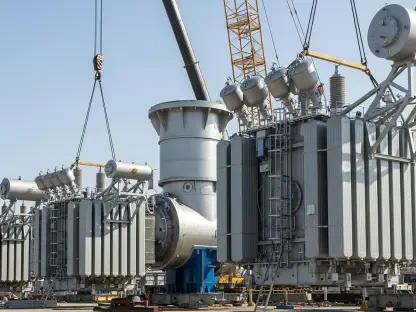Tamil Nadu, a southern state in India, is carving out a remarkable position as a frontrunner in the global push for sustainable energy, with an ambitious vision to create a South Asian Renewable Energy Corridor. This groundbreaking initiative, unveiled by the State Minister for Transport and Electricity, S. S. Sivasankar, during a prominent energy conference in the state capital, seeks to deliver round-the-clock renewable power through collaboration with neighboring countries like Sri Lanka. By positioning itself as a clean energy gateway for the region, Tamil Nadu is not only focusing on its own green transition but also fostering international partnerships that prioritize sustainable development. This bold step underscores the state’s commitment to addressing climate challenges while energizing economies across South Asia, setting a powerful example for others to follow in the pursuit of a cleaner, more resilient future.
Pioneering Renewable Energy Expansion
Scaling Up Solar and Wind Capacities
Tamil Nadu is driving an aggressive expansion of its renewable energy portfolio, with a clear target to add 10,000 MW of solar power and 2,000 MW of wind power within the next five years starting from 2025. Blessed with abundant sunlight and a sprawling coastline, the state is uniquely positioned to harness these natural resources effectively. The strategy integrates solar and wind projects with advanced energy storage systems to ensure a consistent and reliable power supply, even during periods of low generation. Already a leader in India for installed wind energy capacity, Tamil Nadu continues to build on this strength through innovative measures like repowering aging turbines and establishing hybrid wind-solar parks. These efforts reflect a forward-thinking approach that maximizes output while optimizing existing infrastructure, ensuring the state remains at the forefront of renewable energy adoption in the country.
Innovative Policies for Sustainable Growth
Beyond capacity growth, Tamil Nadu is setting benchmarks with its forward-looking policies designed to modernize and sustain its renewable energy sector. In recent years, it became the first Indian state to introduce a Wind Repowering Policy, a move that enhances the efficiency of older wind installations by upgrading them with cutting-edge technology. Additionally, the state has rolled out a Pumped Storage Policy and a Small Hydel Policy, while working on an Integrated Renewable Energy Policy to streamline efforts across various clean energy domains. These initiatives are complemented by investments in technologies like battery energy storage systems (BESS) and smart grids to minimize energy waste and improve grid stability. A notable project includes a 500 MW/1000 MWh BESS, expected to commence commercial operations by December 2026, highlighting the state’s dedication to integrating innovative solutions for a seamless energy transition.
Building a Global Clean Energy Ecosystem
Attracting Investment and Partnerships
Tamil Nadu’s openness to private investment and international collaboration sets it apart as a hub for renewable energy innovation, particularly in emerging fields like advanced wind turbine technologies and offshore wind platforms. The state is actively working to establish India’s first offshore wind ecosystem along its extensive coastline, inviting foreign direct investment and fostering supply chain partnerships. With a robust manufacturing base that produces 500 MW of wind blades and turbines and 3,000 MW of solar panels and wafers annually, Tamil Nadu plays a critical role in India’s renewable energy value chain. These efforts not only bolster local economies but also position the state as an attractive destination for global stakeholders looking to contribute to the clean energy sector, creating a ripple effect of sustainable growth across the region.
Commitment to a Net-Zero Vision
A core pillar of Tamil Nadu’s renewable energy strategy is its unwavering commitment to achieving a net-zero future through collaborative and innovative efforts. Boasting over 20 GW of installed renewable capacity, including more than 10 GW from wind power alone, the state remains a trailblazer in India’s clean energy landscape. Historical milestones, such as pioneering wind energy banking in 1990—a first in the nation—demonstrate a long-standing dedication to sustainability that continues to evolve. The vision articulated by state leadership emphasizes regional cooperation and community empowerment, ensuring that the benefits of clean energy reach far beyond mere power generation. By aligning technological advancements with policy innovation and international partnerships, Tamil Nadu has crafted a holistic approach that serves as a model for others aspiring to balance economic progress with environmental responsibility.
Charting the Path Forward
Reflecting on a Legacy of Innovation
Looking back, Tamil Nadu’s journey in renewable energy has been marked by pioneering steps that reshaped India’s approach to sustainability. From introducing wind energy banking decades ago to launching policies like wind repowering and pumped storage in recent times, the state has consistently demonstrated a knack for innovation. Projects that integrated solar and wind with storage systems tackled reliability issues head-on, while a strong manufacturing foundation supported both local and national clean energy goals. These achievements, built on a foundation of over 20 GW of installed capacity, have positioned Tamil Nadu as a leader not just in India but across South Asia, inspiring neighboring regions to pursue similar paths toward a greener future.
Envisioning Future Collaborations
As the renewable energy landscape evolves, Tamil Nadu’s next steps should focus on deepening international ties and scaling up cutting-edge projects like offshore wind ecosystems. Exploring additional storage solutions and smart grid technologies will be crucial to handle growing capacities. Encouraging more private sector involvement can accelerate innovation, while regional partnerships, especially with countries like Sri Lanka, could amplify the impact of the South Asian Renewable Energy Corridor. By prioritizing these strategies, Tamil Nadu can continue to lead by example, ensuring that clean energy becomes a shared resource that drives sustainable progress for generations to come.









